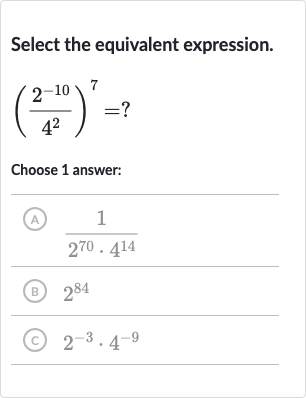Full solution
Q. Select the equivalent expression.Choose answer:(A) (B) (C)
- Simplify base: Simplify the base of the exponent.We have the expression . First, we need to simplify the base. Since is , we can rewrite as .
- Power rule: Apply the power of a power rule.Using the power of a power rule, which states that , we can simplify as .
- Rewrite expression: Rewrite the original expression with the simplified base.Now we can rewrite the original expression as .
- Quotient rule: Apply the quotient of powers rule.Using the quotient of powers rule, which states that , we can simplify the expression inside the parentheses as .
- Power rule again: Apply the power of a power rule again.Now we have . Using the power of a power rule again, we can simplify this as .
- Check answer choices: Check the answer choices.We have simplified the expression to . Now we need to check which answer choice matches this expression.(A) does not match because it has positive exponents and includes a factor of .(B) does not match because it has a positive exponent and the exponent is different from .(C) does not match because it has two separate bases and the exponents do not add up to .None of the answer choices match our simplified expression.
More problems from Evaluate expressions using properties of exponents
QuestionGet tutor help

